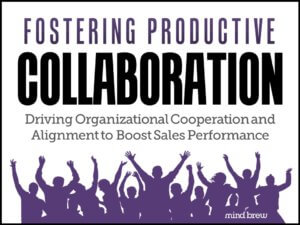In our research, we’ve found that there are three main reasons sales training tends to “fade away” over a relatively short period of time. Two of these reasons are frequently cited by other pundits and analysts covering B2B sales practices and processes:
- The sales training is not being reinforced over time. Very often, sales training is treated more like an event, rather than an ongoing process. Salespeople are gathered in a room for a few hours of training, and then it’s back to business as usual. For any sort of training to be effective, it has to be reinforced continuously, at all levels of the sales organization.
- The principles and practices are not being infused into operations. The concepts and practices being taught in the sales training are often separate and/or different from the systems and processes that salespeople are expected to interact with on a daily basis. This creates a big disconnect where the training is telling them one thing, but the systems and processes are saying something else entirely. It’s important to recognize that systems and processes will always win.
Again, these two reasons are discussed quite a bit in the space and are probably nothing new to our subscribers. However, we’ve identified a third reason—one that doesn’t seem to get the attention it really deserves:
- The sales training is not relevant to the task at-hand. Most sales training programs will teach things that are interesting and powerful in general. But if those concepts and techniques are not aligned to the unique challenges and specific problems that salespeople are encountering in the marketplace, they are irrelevant. For example, it’s always good to know how to better differentiate your offerings from competitive alternatives. But if your company’s primary challenge in the marketplace has to do with getting prospects to take action in the first place, then differentiation training will be largely irrelevant to the challenge at-hand.
Maximizing the Effectiveness of Sales Training
Even though the “relevance” factor doesn’t seem to get much attention, from our perspective, it’s actually the most important of the three when it comes to driving stickiness. Why?
Sales training that is relevant to the real day-to-day problems is much more likely to be embraced by salespeople from the beginning—without the cajoling and mandates that are so typical. And the more the concepts, principles, and practices align to the actual situation on the ground, the easier it is to reinforce over time, infuse into operational systems and processes, and so on.
Simply put, relevance is the “draw” that makes salespeople want to learn and use what’s in the training. And in this way, relevance becomes a force-multiplier that makes everything else that much easier and more effective.











